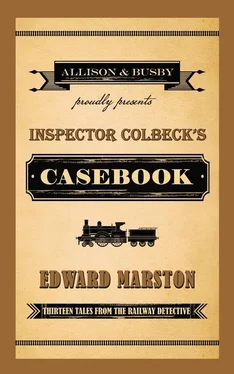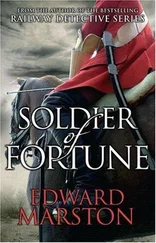Edward Marston - Inspector Colbeck's Casebook
Здесь есть возможность читать онлайн «Edward Marston - Inspector Colbeck's Casebook» весь текст электронной книги совершенно бесплатно (целиком полную версию без сокращений). В некоторых случаях можно слушать аудио, скачать через торрент в формате fb2 и присутствует краткое содержание. Год выпуска: 2014, ISBN: 2014, Издательство: Allison & Busby, Жанр: Исторический детектив, на английском языке. Описание произведения, (предисловие) а так же отзывы посетителей доступны на портале библиотеки ЛибКат.
- Название:Inspector Colbeck's Casebook
- Автор:
- Издательство:Allison & Busby
- Жанр:
- Год:2014
- ISBN:9780749014742
- Рейтинг книги:4 / 5. Голосов: 1
-
Избранное:Добавить в избранное
- Отзывы:
-
Ваша оценка:
- 80
- 1
- 2
- 3
- 4
- 5
Inspector Colbeck's Casebook: краткое содержание, описание и аннотация
Предлагаем к чтению аннотацию, описание, краткое содержание или предисловие (зависит от того, что написал сам автор книги «Inspector Colbeck's Casebook»). Если вы не нашли необходимую информацию о книге — напишите в комментариях, мы постараемся отыскать её.
Inspector Colbeck's Casebook — читать онлайн бесплатно полную книгу (весь текст) целиком
Ниже представлен текст книги, разбитый по страницам. Система сохранения места последней прочитанной страницы, позволяет с удобством читать онлайн бесплатно книгу «Inspector Colbeck's Casebook», без необходимости каждый раз заново искать на чём Вы остановились. Поставьте закладку, и сможете в любой момент перейти на страницу, на которой закончили чтение.
Интервал:
Закладка:
‘It pains me to say this, my lord,’ she said, deferentially, ‘but it’s a fake.’
‘How dare you even suggest it!’ exclaimed Stennard.
‘My wife knows the painting extremely well,’ said Colbeck.
‘And so do I. That’s a genuine Turner — take my word for it.’
‘Then where is the hare?’ asked Madeleine, pointing. ‘In the right-hand corner, there should be a hare. It’s not very distinct in the original but it’s there.’
Stennard used his monocle to scrutinise the canvas. Refusing to believe that he’d been duped, he searched for the tiny animal but to no avail. It was not there. Madeleine had exposed a fraud.
‘There’s one way to make certain,’ said Colbeck, lifting the frame from its hood and lowering it to the floor. He turned it round to examine the back. Fresh tacks had been put into it. There were holes where the original ones had been removed. ‘The evidence is fairly conclusive, I think.’
Stennard’s heart missed a beat as the saw the telltale holes. Turner’s work had been removed and a copy of it put in its place. His earlier delight was transformed into cold fury. He rounded on Colbeck.
‘We’ve been tricked,’ he roared. ‘I paid all that money for a fake.’
‘I had a feeling that it might be a clever copy,’ said Colbeck, smoothly. ‘They kept the original so that they could extract even more money out of you. In time, you’d have received a second demand.’
‘A second demand?’ Stennard goggled. ‘What is going on?’
Colbeck moved away. ‘Excuse me, my lord. I have to authorise some arrests.’
Herbert Stagg counted out the money with a gleeful chuckle. The short, stout man who’d called at his lodging was Ruthin Woodvine, an art dealer. He was paying Stagg for the valuable information he’d received. Woodvine shared his elation.
‘And the best part of it is that there’s more to come,’ he said, smugly. ‘When he realises that he paid for a fake, Stennard will stump up three times that amount to get the original back. We’ll have made a small fortune.’
‘Richmore would kill me if he knew what I’d done.’
‘You pulled the wool over his eyes good and proper.’
‘The real credit belongs to you, Mr Woodvine. You know about art.’
‘I know about people,’ corrected the other, ‘and know just how much they’re prepared to cough up for something they’re desperate to hang on their wall. Come,’ he went on, getting up from the table. ‘We must go and celebrate.’
Stagg scooped up the money. ‘The first drink is on me.’ A loud knock on the door made him thrust the cash into his pocket. ‘That’s probably my landlord, asking for the rent. I’ll be able to pay him now.’
He opened the door and found himself facing a determined Victor Leeming. Behind the sergeant were two uniformed policemen. Leeming doffed his hat.
‘Good day to you, Mr Stagg,’ he said. ‘I have a warrant for your arrest.’ His gaze moved to the art dealer. ‘And you, I suspect, sir, may be Ruthin Woodvine. You are also wanted in connection with the theft of a painting so you’ll have to come along with us. The game is up, I fear.’
Stagg was rooted to the spot but Woodvine thought only of escape. Opening his frock coat, he put a hand inside to grab his revolver but he was far too slow. Leeming was on him at once, felling him with a single, uncompromising blow to the chin. As the art dealer collapsed at his feet, Leeming relieved him of the weapon.
‘Thank you, Mr Woodvine. I’ll take that.’
‘There must be some mistake,’ gibbered Stagg.
‘There was, sir, and it was your cousin, the coachman, who made it. If you tell barefaced lies to Inspector Colbeck, you’re bound to come to grief in the end.’
Edward Tallis was basking in the reflected glory of his officers. A crime had been solved, the perpetrators were behind bars and he had a glowing letter of thanks from Lord Stennard on the desk in front of him. He sought clarification.
‘What aroused your suspicion about the coachman?’ he asked.
‘It was that story about being held up on the way to the station,’ said Colbeck. ‘He claimed that the road was blocked. Yet when I drove a carriage along it, I couldn’t see any place where he could be impeded by an overturned cart. He could simply have driven around it. You see, sir,’ he continued, ‘there had to be collusion with someone at Stennard Court. It was the coachman. There was no second carriage that picked up the painting at the station. Lord Stennard’s coachman drove there at the agreed time with Woodvine as his passenger. Richmore wouldn’t have been able to identify the coachman again because it was raining and the man was hidden beneath a cape and hat. Stagg, of course, was part of the gang. The daring theft was only made possible by the fact that the coachman was his cousin.’
‘Remarkable!’ said Tallis, sitting back. ‘Turner’s original painting is back in its frame and the malefactors will each collect a very long prison sentence. There’s just one thing that puzzles me,’ he added, stroking his moustache. ‘Lord Stennard is an acknowledged connoisseur in the art world. Why didn’t he spot that the painting he bought back was a fake?’
‘Lord Stennard is blind in one eye and has such poor vision in the other that he uses a monocle. The coachman was aware of that. When the information was passed on to Woodvine, the art dealer saw his chance. I feel sorry for Lord Stennard. He can take in the sheer wonder of a painting in its entirety but his impaired eyesight means that he can’t appreciate the fine detail.’
‘So who did establish that the painting was a fake?’
Colbeck thought fondly of Madeleine. ‘We were lucky to have an expert at hand, Superintendent.’
THE RAILWAY CHURCH
Old age had sapped his strength and bent his back but Simon Gillard’s devotion to duty was unaffected by the passage of years. Indeed, now that he had retired, he was able to dedicate himself completely to his work as churchwarden. Gillard needed no encouragement to drag himself out of bed on the Sabbath. He was always up early, lifted by a feeling of importance and filled with pure joy. It was the one day of the week when his bones never ached. During the short walk to church that morning, he went through his usual ritual, reminding himself of what he had to do before the congregation arrived for a service of Holy Communion.
Gillard had to let himself into the church, unlock the cupboard in the vestry so that the sacristan could prepare the altar, slide the hymn numbers into the wooden display board above the pulpit, open the bible on the lectern at the appropriate page for the readings and set the offertory plate in position. There would be a number of other tasks to complete before the others turned up. Gillard knew the routine off by heart and drew immense solace from the thought that he was doing God’s work and serving the community. As he turned the key in the lock, the door opened smoothly on well-oiled hinges and he stepped inside.
There were people in Wolverton who sneered at the church of St George the Martyr because it had been built fifteen years earlier by the London to Birmingham Railway Company to supply the spiritual needs of their employees and their families. Critics disliked what they saw as a church built on traditional lines with a decidedly utilitarian air about it. It blended in with the terraces of small, plain, relentlessly uniform railway houses. Some argued that the church had no history, no grandeur, no sense of being on consecrated ground and no right to be there. Gillard disagreed. To him, it was as inspiring as the greatest of medieval cathedrals. Alone in the church of St George the Martyr, he felt that he was in direct communication with the Almighty. Standing in the nave, as he did now, he looked towards heaven and offered up a silent prayer.
Читать дальшеИнтервал:
Закладка:
Похожие книги на «Inspector Colbeck's Casebook»
Представляем Вашему вниманию похожие книги на «Inspector Colbeck's Casebook» списком для выбора. Мы отобрали схожую по названию и смыслу литературу в надежде предоставить читателям больше вариантов отыскать новые, интересные, ещё непрочитанные произведения.
Обсуждение, отзывы о книге «Inspector Colbeck's Casebook» и просто собственные мнения читателей. Оставьте ваши комментарии, напишите, что Вы думаете о произведении, его смысле или главных героях. Укажите что конкретно понравилось, а что нет, и почему Вы так считаете.












